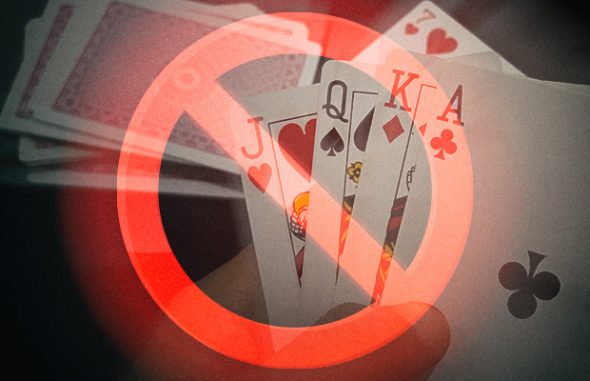Hot Take: Why You Should NEVER Count Cards

There are some commonly held beliefs in online gambling circles that are so popular, they are practically taken as gospel!
“Only play single zero roulette wheels.”
“Stay away from the side bets.”
“Never play poker against anyone named Doc.”
“Every serious blackjack player should always count cards.”
On the first three points, we wholeheartedly agree. But when it comes to that last one…
… we’re not so sure.
Whoa, whoa! Take it easy! We acknowledge that, in theory, counting cards provides serious mathematical benefits against the house. There’s no question about it. It’s equally true that, for aspirants to true advantage player status, at least one counting system is an essential part of the required skill set.
In theory.
In practice, though… is this really a strategy everyone should employ?
Maybe.
Maybe not. While depictions of blackjack in popular culture seem to emphasize card counting to an almost absurd degree, there is a strong case to be made against counting cards.
Without further ado, here is why most players should not bother with card counting.
It’s Hard to Learn
There’s a reason why, in plenty of depictions in mainstream culture, card counting is portrayed as the domain of genius savants only. Is it actually as complex as astrophysics, or quantum field theory?
Mercifully not!
But that doesn’t make it easy to learn.
Serious players already first have to memorize the basic strategy chart for their chosen game – this means memorizing about 250 game scenarios, so that response becomes second nature.
After that, it’s time to learn how to handle all of the common rule variations. (ie. “when to double up after split,” “late surrender,” and so on.) Then, on top of that, you’ll have to learn a counting system (like HI-Lo).
To truly master counting, it will then be time to learn to keep up a running count, and effortlessly divide by fractions to get the true count. There are at least 18 game indices to learn, plus bankroll management, risk of ruin, and plenty more.
Make no mistake – this is not a simple skill to learn over the weekend! It requires sweat equity, time, hard work, and discipline.
It’s Hard to Find a Good Game
Say you’ve invested the many, many hours (and bets) so that card counting has been learned. Now, you have to find the right table to put those skills to use, so as to gain that oh-so-beloved advantage over the house. Where do you start?
Well, if you play standard, 8-deck games, you’ll have to contend with countermeasures like “no mid-shoe entry,” or preferential shuffling. If you want to play games with fewer decks, where card counting offers the biggest mathematical advantage, you may have to play games with bad rules (think 6:5 blackjack payouts, “dealer beats soft 17,” and the like). This alone will cut way into your bottom line, and may neutralize any advantage you may gain from counting.
And if you do find a good game, you’ll have to spend a great deal of time betting at or near the minimum, waiting for the count to get high… meaning that you’ll probably spend far more time looking for an advantageous situation than actually playing in one.
The House is Working Against You
Suppose that you learn the necessary skills AND find a good game. Ready to go to work?
Well, enjoy! You’ve probably got about an hour of solid play before the casino has you spotted.
That’s right: modern casinos invest significant resources trying to identify card counters before they can do serious damage to the house’s bottom line.
There are a number of ways they do this, but the long and short of it is that card counting systems have been around a long time, and are relatively easy to spot if you know what to look for. Master counters routinely accept offers to teach defensive measures to casinos.
Players are left with an unfortunate choice: learn to camouflage their counting skills (which requires hundreds more hours of work, as well as tremendous further bankroll risk), or rest assured knowing that they will be caught.
One more thing: once you’ve been caught, your image and/or IP address will be shared with other casinos instantaneously, making you much easier to catch next time. After that’s happened, your hard-earned advantage is more or less worthless.
The Profit Potential is Low
If you’ve only just read about the MIT counting team, you can be forgiven for thinking that card counters win millions just about every weekend. In reality, though, this is not quite the case.
You won’t win millions. You probably won’t win thousands.
Remember that, even if a player does hold the advantage over the house, it is a very slim advantage indeed.
How small?
With perfect play and ideal gaming conditions, we’re still talking about an edge of .5–2% over the house.
In other words, if you wager $1000 per hour, you’re looking at an average hourly rate of $5-$20.
That’s hardly the hourly wage of a future millionaire!
Oh yeah, and that’s the hourly rate before expenses like travel, hotel, tips, and food. It’s before taxes.
Also, it’s an average! Which brings us to our final point…
Brutal Bankroll Swings
All it takes is a quick look at online blackjack forums to hear some truly horrific stories of bad luck that lasts for hundreds and hundreds of hours.
Remember, blackjack is still a game of chance. Even if you are in the (almost fantastical) position of enjoying a 52:48% advantage over the house, you’re still going to lose a lot of hands. And while bigger wins are a welcome deviation from the mean, big losses are going to factor in from time to time as well.
These can be financially and psychologically devastating.
Few players have the resources to be five figures down in losses without really deeply feeling the impact. And even fewer new card counters appreciate how bad it can get.
In summation, think twice before committing to card counting!
While it definitely can provide an advantage, it’s a far cry from the glamorous, money-making machine most people usually imagine it to be.












